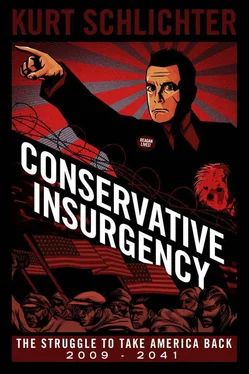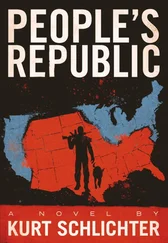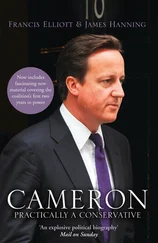Kurt Schlichter - Conservative Insurgency
Здесь есть возможность читать онлайн «Kurt Schlichter - Conservative Insurgency» весь текст электронной книги совершенно бесплатно (целиком полную версию без сокращений). В некоторых случаях можно слушать аудио, скачать через торрент в формате fb2 и присутствует краткое содержание. Год выпуска: 2014, ISBN: 2014, Издательство: Post Hill Press, Жанр: Социально-психологическая фантастика, humor_satire, на английском языке. Описание произведения, (предисловие) а так же отзывы посетителей доступны на портале библиотеки ЛибКат.
- Название:Conservative Insurgency
- Автор:
- Издательство:Post Hill Press
- Жанр:
- Год:2014
- ISBN:978-1-61868-977-1
- Рейтинг книги:5 / 5. Голосов: 1
-
Избранное:Добавить в избранное
- Отзывы:
-
Ваша оценка:
- 100
- 1
- 2
- 3
- 4
- 5
Conservative Insurgency: краткое содержание, описание и аннотация
Предлагаем к чтению аннотацию, описание, краткое содержание или предисловие (зависит от того, что написал сам автор книги «Conservative Insurgency»). Если вы не нашли необходимую информацию о книге — напишите в комментариях, мы постараемся отыскать её.
Conservative Insurgency
Conservative Insurgency — читать онлайн бесплатно полную книгу (весь текст) целиком
Ниже представлен текст книги, разбитый по страницам. Система сохранения места последней прочитанной страницы, позволяет с удобством читать онлайн бесплатно книгу «Conservative Insurgency», без необходимости каждый раз заново искать на чём Вы остановились. Поставьте закладку, и сможете в любой момент перейти на страницу, на которой закончили чтение.
Интервал:
Закладка:
The term “Republicans” is ambiguous because there was often open conflict within the Republican Party between the old-guard establishment and the constitutional conservatives. The constitutional conservatives would often label moderate Republicans RINOs (Republicans In Name Only), though that species became less and less common as the party moved right throughout the 2010s and 2020s.
When describing their opponents on the left side of the spectrum, the constitutional conservatives tended to use various terms nearly interchangeably: progressive, liberal, and even leftist. This can be confusing because progressives, liberals, and leftists see themselves as quite different even if no one else tends to. Moreover, there were “progressive Republicans,” exemplified by Senator John McCain, who shared a faith in government action, if little else, with leftist progressives.
The Democratic Party became much more ideologically homogenous earlier than the GOP; by the mid-2000s, when Senator Joe Lieberman was effectively expelled, there were no arguably “conservative” major Democratic figures. Accordingly, “Democrat” became synonymous with “liberal” in conservative circles, even if Democrats themselves would rarely use the terms that way.
Imputing too much precision into these imprecise terms is an invitation to confusion, and there seems little benefit in the form of a greater understanding to be had from undertaking that burden. In order to avoid attempting to divine each speaker’s intent as to his usage of the various terms, they are simply transcribed verbatim. The reader may evaluate them for himself in the context in which they appear.
Introduction
I originally raised the idea of writing an oral history of the conservative movement that arose during the first Barack Obama administration with the head of the University of California, San Diego, History Department two years ago. I was a bit surprised by his reaction—instead of encouraging me, he attempted to talk me out of it.
Jeff Rayburn was a West Pointer and a decorated war hero of Afghanistan and Iraq whose hard-core conservative views mirrored those of better than half the faculty in the new academia of the mid-twenty-first century. One might think that he would be excited about one of his department members undertaking a project that would track how a disorganized, decentralized band of committed citizens he supported had managed to create not only political but cultural change that sent the United States on an entirely new sociopolitical trajectory in just 30 years.
“Do we really need another book on how wonderful conservatives are?” he asked me, sounding bored. “I’ve got a shelf full of them. Hell, I wrote one.”
It was true, literally. In Jeff’s office there is a bookcase full of hardcovers dealing with modern conservative politics—to this day he refuses to read books on electronic devices—and one of them, a bestseller in fact, he wrote.
But I was looking to do something else. My goal is not to praise the movement but to let it speak for itself. What interested me—and what I hope the stories I have collected here cast some light on—is how a discredited, dispirited, and government-targeted ideology morphed into a movement that overcame the liberal establishment.
“You know what you’re talking about,” Jeff said off-handedly, “is an insurgency. I know one when I see one because I fought a couple of them. It was a conservative insurgency that changed America. A small, dedicated group, defying a corrupt, decrepit authority, and winning through persistence and dedication.”
That idea formed the nucleus of this book, a book about how regular Americans not only seized control of the apparatus of government but won over society itself to its worldview.
As a historian, documenting the conservative insurgency was a challenge because of its very nature. This was not the story of a single “great man” who came along at just the moment his country needed him. There is no Washington, Lincoln, King, or even a Reagan whose biography I could use as a means to tell the story of the struggle. While many of the individuals who rose to prominence during this process were notable for their foresight, courage, and wisdom, in retrospect these leaders were largely fungible. No one name comes to mind when we think about the last 30 years.
This was not a top-down movement but one created, motivated, and executed from the bottom up. Franklin Roosevelt will be forever linked with the New Deal, and Ronald Reagan with the “Reagan Revolution,” but there was no single man or woman who led this revolution. Instead, it was thousands, and then millions, of individuals whose decentralized actions changed the course of American history.
I can best tell their collective story by letting them each tell their own individual stories in their own words.
Although more than 300 million Americans lived through the tumultuous events of the last three decades, we do not all share the same perspective on them. For instance, as a young academic at the time, I was largely unaware of just how great the impact of the Obama administration’s policies was upon a huge swath of American citizens. I heard President Obama promise to “fundamentally change” the nature of the country, and I nodded at what I saw as a pleasing rhetorical flourish and went about my life, as did many similarly situated, moderately liberal Americans. But conservative Americans heard this and were chilled to the bone. Their worst fears were proven true as the Obama administration moved relentlessly to impose its liberal vision upon them and what they saw as the country they had built with their sweat and blood.
Obama came to office in the wake of a sudden, paradigm-rattling economic crisis caused not by the usual ups and downs associated with the business cycle but by large, government-connected businesses whose reckless actions brought the country to the brink of catastrophe. The response to this crisis, declared a bipartisan establishment within a matter of days after its leaders emerged from closed-door consultations, was to be a giant government bailout.
Of course, the great American middle class had long been “bailing out” the poor with social programs. It perceived these transfers of wealth as at least marginally justifiable, though it generally conceived them as going to ameliorate self-induced social pathologies.
The middle class had likewise been bailing out the wealthy elite—“corporate welfare” had long been a fixture of the liberal critique of the system—but the beneficiaries had heretofore wisely kept that web of subsidies, tax breaks, and special privileges largely out of sight. However, there was no hiding the TARP bailout, nor the fact that it was imposed without meaningful debate via the consensus of the elite over the objections of Middle America.
Middle America saw itself pushed to the sidelines by a coalition of the very poor and the very powerful. It was expected to wait silently as the nation’s fate was decided by others, while it was also expected to continue to work hard and to pick up the tab.
The Tea Party revolt of the first Obama term was a direct reaction to Middle America being excluded from power. The Tea Party movement was fueled by a critique of the establishment that centered on the primacy of the Constitution as written and a suspicion of the poor/powerful coalition of government rent seekers. What distinguished it was its bottom-up nature—it was organized not by a formal cadre of “community organizers” (the left’s preferred model) but by individuals spontaneously springing into action across the country. Traditionally entrepreneurial—it is no surprise that many Tea Party activists were small business people and that their targets included the large corporations that succeeded largely through government lobbying—these activists turned those skills from commerce to politics. Soon, seemingly overnight, hundreds of Tea Party–affiliated groups were up and operating.
Читать дальшеИнтервал:
Закладка:
Похожие книги на «Conservative Insurgency»
Представляем Вашему вниманию похожие книги на «Conservative Insurgency» списком для выбора. Мы отобрали схожую по названию и смыслу литературу в надежде предоставить читателям больше вариантов отыскать новые, интересные, ещё непрочитанные произведения.
Обсуждение, отзывы о книге «Conservative Insurgency» и просто собственные мнения читателей. Оставьте ваши комментарии, напишите, что Вы думаете о произведении, его смысле или главных героях. Укажите что конкретно понравилось, а что нет, и почему Вы так считаете.












